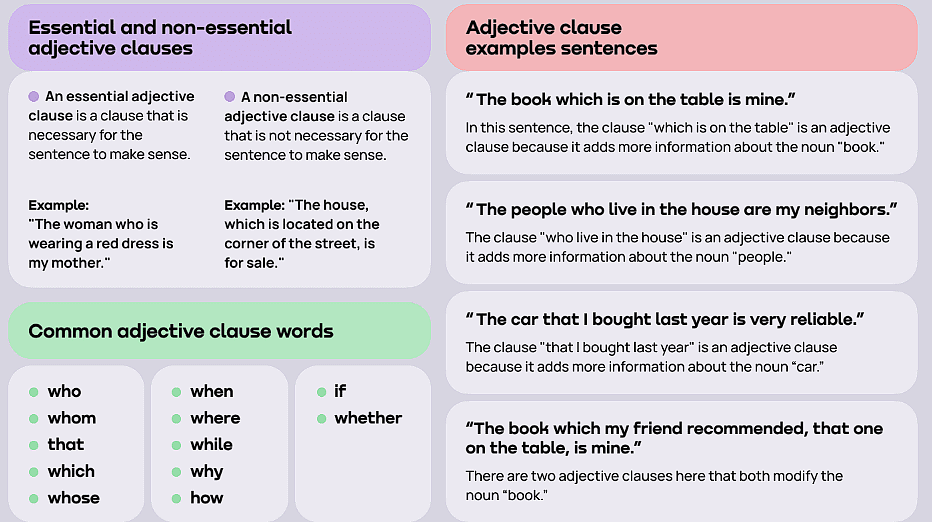Adjective Clauses | Basic Grammar for IELTS PDF Download
Adjective Clauses
Adjective clauses, also known as relative clauses, are a type of dependent clause that function as adjectives within a sentence. They provide additional information about a noun or pronoun, helping to describe or identify it more specifically.
Adjective clauses are introduced by relative pronouns (e.g., who, whom, whose, which, that) or relative adverbs (e.g., where, when, why). The choice of relative pronoun or adverb depends on the role and function of the clause within the sentence.
Examples:
- Relative pronoun: "The person who called me is my friend."
- Relative adverb: "This is the place where we met."
- Adjective clauses are introduced by relative pronouns (e.g., who, whom, whose, which, that) or relative adverbs (e.g., where, when, why).
- The choice of relative pronoun or adverb depends on the role and function of the clause within the sentence.
- Examples: Relative pronoun: "The person who called me is my friend." Relative adverb: "This is the place where we met."

Adjective clause examples sentences
Let's look at some more examples of adjective clauses in action.
(a) The book which is on the table is mine.
In this sentence, the clause "which is on the table" is an adjective clause because it adds more information about the noun "book."
(b) The people who live in the house are my neighbors.
The clause "who live in the house" is an adjective clause because it adds more information about the noun "people."
(c) The car that I bought last year is very reliable.
The clause "that I bought last year" is an adjective clause because it adds more information about the noun “car.”
(d) You can even create complex adjective clauses, such as:
The book which my friend recommended, that one on the table, is mine.
Essential and Non-Essential Adjective Clauses
Adjective clauses can be essential or non-essential. An essential adjective clause is a clause that is necessary for the sentence to make sense. For example, in the sentence, "The woman who is wearing a red dress is my mother," the clause "who is wearing a red dress" is essential because it is necessary for the sentence to make sense.
On the other hand, a non-essential adjective clause is a clause that is not necessary for the sentence to make sense. For example, in the sentence, "My mother, who is wearing a red dress, is the best cook in the family," the clause "who is wearing a red dress" is non-essential because the sentence still makes sense without it.
Here are some more examples of non-essential adjective clauses:
"The book, which my friend recommended, is mine."
"The house, which is located on the corner of the street, is for sale."
“The cat, who was sleeping in the sun, woke up when I called her.”
List of Common Adjective Clause Words
Now that we have discussed the concept of adjective clauses and their essential and non-essential forms, let's look at a list of common words that can be used to form adjective clauses. The following words are commonly used to introduce adjective clauses:
who
whom
that
which
whose
These words can be used to introduce adjective clauses which modify a noun or a pronoun. For example, in the sentence, "The man who lives next door is my neighbor," the word "who" is used to introduce the adjective clause “who lives next door.”
In addition, the following words can be used to join two clauses together in an adjective clause:
when
where
while
why
how
For example, in the sentence, "I know how she solved the problem," the word "how" is used to join two clauses together in an adjective clause.
The following words can be used to create an essential adjective clause:
if , whether For example, in the sentence, "I don't know if she will come," the word "if" is used to create an essential adjective clause.
Difference between adjective clause and adjective phrase
The primary distinction between an adjective clause and an adjective phrase is that an adjective clause includes a subject and a verb, whereas an adjective phrase does not. Adjective clauses consistently modify nouns or pronouns, while adjective phrases can modify both nouns and verbs.
For instance, in the sentence "The woman who works here is my friend," the word "who" introduces an adjective clause that describes the noun "woman." Conversely, in the sentence "She works here often," the term "often" is an adjective phrase that modifies the verb "works."
|
18 videos|54 docs
|
FAQs on Adjective Clauses - Basic Grammar for IELTS
| 1. What is a relative clause? |  |
| 2. How are adjective clauses placed in a sentence? |  |
| 3. What is the difference between an essential (restrictive) and non-essential (non-restrictive) adjective clause? |  |
| 4. Can you provide an example of an essential (restrictive) adjective clause? |  |
| 5. Can you provide an example of a non-essential (non-restrictive) adjective clause? |  |





















